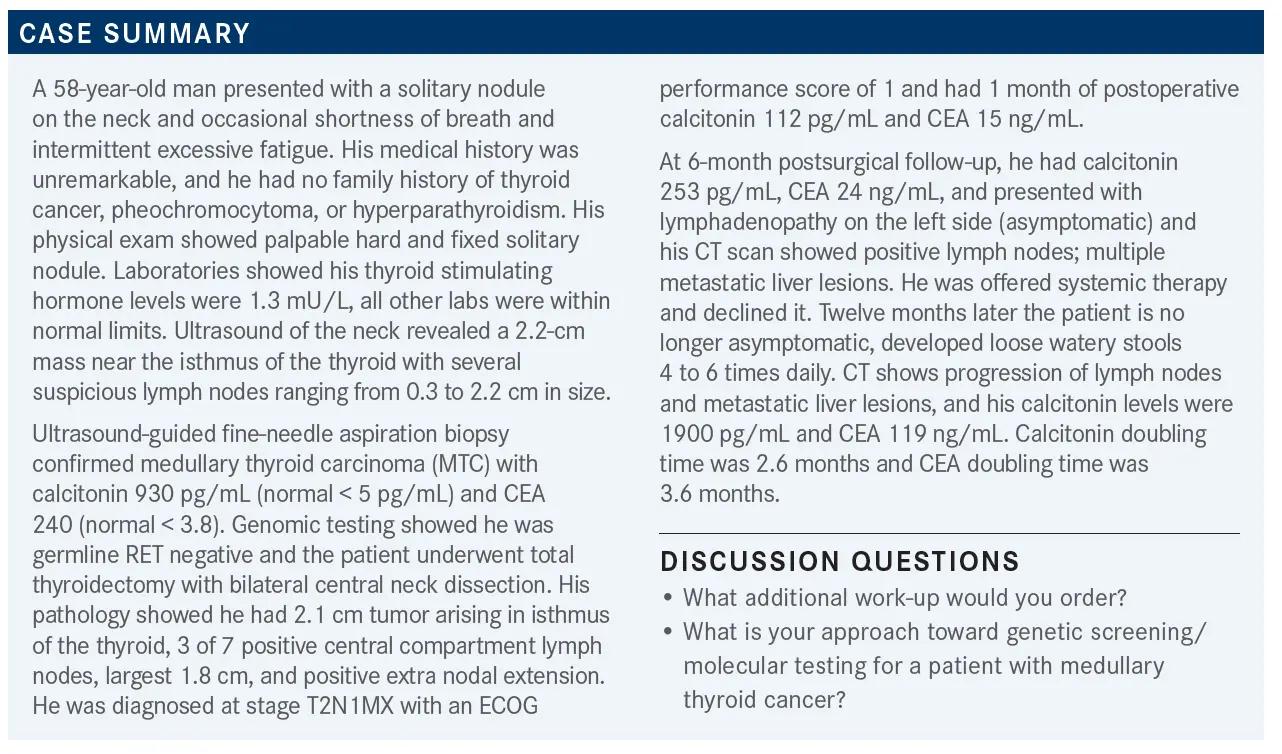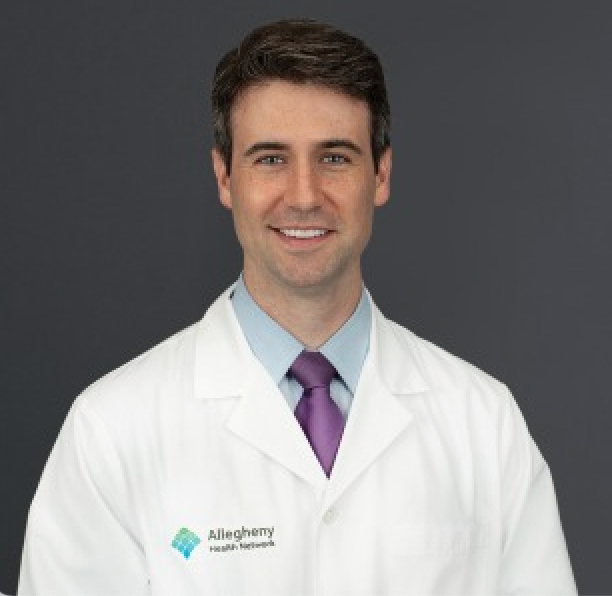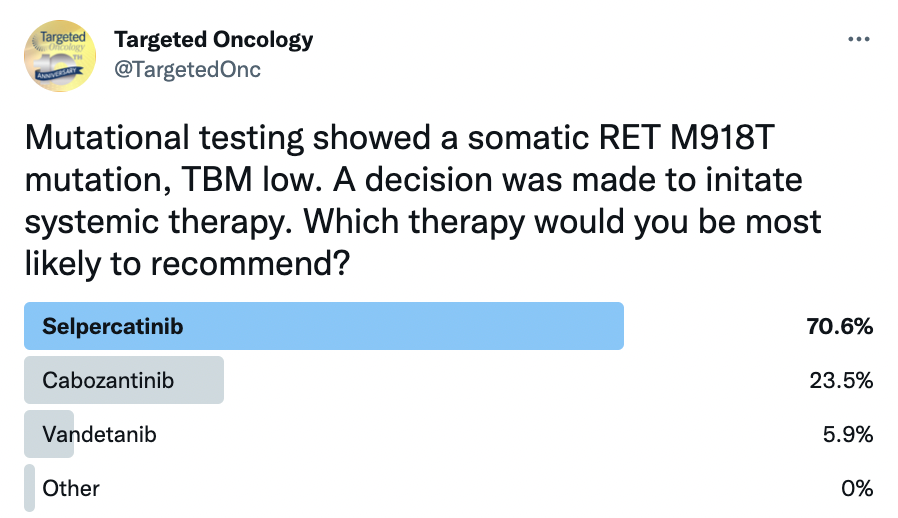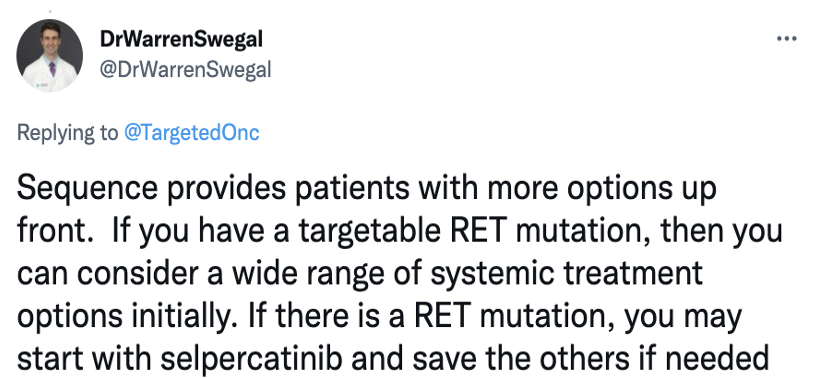Tweet Chat Recap: Swegal Evaluates a Thyroid Cancer Case
In an interview with Targeted Oncology following the tweet chat, Warren Swegal, MD, discussed the key takeaways from the discussion, including his thoughts on the case and what he hopes will be addressed in the future of the thyroid cancer space.


Targeted Oncology was joined on Twitter by Warren Swegal, MD, head and neck surgeon at Allegheny Health Network, for the discussion of treating a 58-year-old man with thyroid cancer.

In a Twitter poll ahead of the discussion, Targeted Oncology followers shared their thoughts on which therapy they would be most likely to recommend for this patient. A majority of responders voted to give this patient selpercatinib (Retevmo; 70.6%), while others would recommend cabozantinib (Cabometyx; 23.5%) and vandetanib (Caprelsa; 5.9%).
While Swegal agreed with the majority's choice to give this patient selpercatinib, a first-in-class, highly selective RET kinase inhibitor, he noted that he would most likely not recommend systemic therapy first.

“Based on the case information, the disease appears limited to the neck and the concern for surgical morbidity is low with the information presented. If there was evidence of locally aggressive disease where surgical morbidity would be extensive, then you could consider systemic therapy. But in the absence of this, it is important to remove the primary bulky disease.”
Swegal also discussed the clinical trial data for selpercatinib in advanced/metastatic RET-alteration positive thyroid cancer by speaking on the most recent research he has seen applied in his own practice.
One of these trials is the phase 1/2 LIBRETTO-001 trial (NCT03157128). Findings revealed that selpercatinib improved overall response rates in most patients with RETmutation medullary thyroid cancer irrespective of prior systemic therapy. As a result of this trial, selpercatinib is being incorporated as a standard of care treatment option for patients with RET-mutant thyroid cancers.
“It is encouraging to say the least. It's not a magic bullet but adds to the arsenal of treatment options. The results from the LIBRETTO-001 trial tell us that it may be used in patients with RET mutations before trailing the others. It’s the combination of both [safety and efficacy data]. Overall lower toxicities and improved efficacy compared with traditional chemotherapy and similar results to other systemic options overall,” said Swegal.
Regarding unmet needs, Swegal explained that many remain in the thyroid cancer space. Whether it be in well differentiated, poorly differentiated, or medullary, he believes that more research needs to be focused on personalized medicine and deciding who needs surgery upfront.
“The role of systemic therapy in general is still an area that needs further exploration, especially how it is related to and used in combination with other treatment modalities like surgery and radiation,” said Swegal. “The personalized medicine aspect of treatment [excites me most]. With next-generation sequencing and targeted therapy, options increase for patients. With more knowledge we will be able to better tailor treatments to individual patients.”
In an interview with Targeted OncologyTM following the tweet chat, Swegal, discussed the key takeaways from the discussion, including his thoughts on the case and what he hopes will be addressed for the future of the thyroid cancer space.
Targeted Oncology: What were your thoughts on this thyroid cancer case?
Swegal: My general takeaway is that this is intermediately, differentiated thyroid cancer. Most treatment is going to be surgical upfront, in terms of either controlling local disease, or local regional disease. The data would suggest that surgical treatment upfront is what's best at the moment in the absence of distant disease or case scenario that suggests persistent disease after surgery, so I would start with surgery upfront.
What are your thoughts on the use of selpercatinib in thyroid cancer?
As a thyroid surgeon, I'm usually not the one prescribing it. That being said, I do work closely with our multidisciplinary thyroid tumor board which focuses on patients with advanced thyroid cancer. Working with the endocrinologist and medical oncologist as a group and as a tumor board, we do tend to recommend targeted treatment when appropriate, including selpercatinib as an option when appropriate.
What is your reaction to the clinical trial data for selpercatinib for advanced/ metastatic RET-alteration positive thyroid cancer?
Specifically looking at the trial, the main thing that stood out was the fact that you could use it in place of the prior targeted options with almost equal efficacy. In a disease that wasn't necessarily head-to-head with traditional chemotherapy, but if you compare that trial data to other trial data looking at traditional chemotherapy, efficacy is as I said, equal if not better.
When comparing separate trials and from a toxicity and scientific standpoint, side effects are pretty low for targeted therapies. Yes, there are some significant grades 3 or grade 4 which occur, but they do much less.
What are your thoughts on molecular testing for patients with thyroid cancer?
One question always is, do you get molecular testing upfront or do you wait for recurrence? I don't think that question is necessarily answered yet and it may not need to be answered at the moment. But for a patient who looks like a good surgical candidate, I normally wouldn't get molecular testing until we knew we needed targeted therapy, but there may be a point to getting that upfront, even if surgery is planned, so that you have that information going in and are keeping all options open to the patient.
What unmet needs still exist in the thyroid cancer space?
There are a number whether you are looking at well differentiated, poorly differentiated, or modularity. The paradigm for a long time has been surgery followed by either radiation, chemotherapy, or now, immunotherapy and targeted treatment.
In terms of need, we talked about personalized medicine being a big need. [Another is] determining who those patients are, who needs surgery upfront, who are the patients who might benefit from targeted treatment upfront, etc. That is an area.
In a lot of other cancers, we are using targeted therapy or even traditional chemotherapy upfront that may be helpful and may make surgery easier. Some patients may not need surgery at all. To call it an unmet need is a little much but is it an area that I see the field going in and I think it would definitely be appropriate.
What would you recommend to community oncologists who might want to learn more about this space?
With well differentiated thyroid cancer, I don't think you need to be super complicated. One can work closely with your endocrinologist, work with your surgeon closely to determine if there is resectable disease, non-resectable, etc. Think about what options you have regarding radioactive iodine and then go from there.
For oncologists who are dealing with poorly differentiated thyroid cancer or medullary thyroid cancer, know that 1 targeted therapy is an option for many patients. Even if they aren't read positive, stay in the case of modulator or BRAF positive. In the case of anaplastic thyroid cancer, there are other proven but useful therapies to trial, especially in patients with metastatic disease.
For those providers who regularly treat advanced thyroid cancer, attendance at national meetings and staying up to date and involved in clinical trials is key to being able to provide your patients with the most cutting-edge options. For those who don’t regularly treat advanced thyroid malignancies, I strongly advise referral to centers who do. We know that high volume care, where it be surgical, radiation based, or medical provides for better care overall.
Cancer care is a team sport and a well-run multidisciplinary team is also crucial to providing the best possible outcomes for our patients.
Anticipating Novel Options for the RAI-Refractory DTC Armamentarium
May 15th 2023In season 4, episode 6 of Targeted Talks, Warren Swegal, MD, takes a multidisciplinary look at the RAI-refractory differentiated thyroid cancer treatment landscape, including the research behind 2 promising systemic therapy options.
Listen